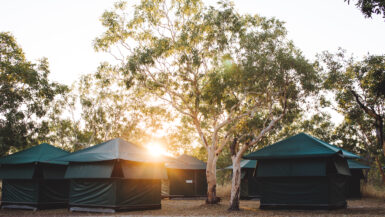Camping is one of the best ways to connect with nature, but it’s important to make sure that our camping practices don’t harm the environment we’re trying to enjoy. Luckily, Canada is home to a variety of eco-friendly camping sites that allow us to experience the great outdoors while minimizing our impact on the planet. From sustainable energy sources to eco-friendly waste management systems, these camping sites are leading the way in sustainable tourism. In this article, we’ll explore some of the best eco-friendly camping sites in Canada, so you can plan your next outdoor adventure with a clear conscience.
Introduction to Eco-Friendly Camping and Its Benefits
Camping is a popular outdoor activity for people of all ages, and it’s a great way to connect with nature and enjoy the beauty of the great outdoors. However, traditional camping practices can have a negative impact on the environment, such as leaving behind trash, damaging natural habitats, and contributing to pollution. That’s where eco-friendly camping comes in.
Eco-friendly camping, also known as sustainable camping, is a way to enjoy the great outdoors while minimizing your impact on the environment. From using biodegradable products to adopting sustainable camping practices, there are many ways to make your camping trip more eco-friendly.
The benefits of eco-friendly camping are numerous. First and foremost, it helps to protect the environment and preserve natural habitats for future generations. Additionally, eco-friendly camping can help to reduce your carbon footprint and promote sustainable living. It’s also a great way to connect with nature and appreciate the beauty of the great outdoors in a responsible way.
In this article, we’ll explore the top eco-friendly camping sites in Canada, as well as features of eco-friendly camping sites, tips for eco-friendly camping, and sustainable camping practices to adopt. We’ll also discuss how to choose an eco-friendly camping site, eco-friendly camping gear and equipment, and the challenges of eco-friendly camping and how to overcome them.
Top Eco-Friendly Camping Sites in Canada
Canada is home to some of the most beautiful and pristine natural landscapes in the world, and there are many eco-friendly camping sites that allow you to enjoy them while minimizing your impact on the environment. Here are some of the top eco-friendly camping sites in Canada:
1. Pacific Rim National Park Reserve, British Columbia
Located on the west coast of Vancouver Island, Pacific Rim National Park Reserve is a stunning natural wonderland that offers a range of eco-friendly camping options. From backcountry camping to front-country camping with amenities, there are many ways to experience the beauty of this park while minimizing your impact on the environment.
2. Algonquin Provincial Park, Ontario
Algonquin Provincial Park is one of Canada’s most popular parks, and it’s also a great place to go eco-friendly camping. With over 1,500 campsites spread across the park, there are plenty of options to choose from. The park also offers a range of sustainable camping practices, such as recycling and composting programs.
3. Fundy National Park, New Brunswick
Fundy National Park is located on the Bay of Fundy in New Brunswick, and it’s known for its stunning coastal landscapes and diverse wildlife. The park offers a range of eco-friendly camping options, including backcountry camping and front-country camping with amenities. The park also has a range of sustainable initiatives, such as energy-efficient buildings and waste reduction programs.
4. Jasper National Park, Alberta
Jasper National Park is located in the heart of the Canadian Rockies, and it’s known for its breathtaking mountain landscapes and abundant wildlife. The park offers a range of eco-friendly camping options, including backcountry camping and front-country camping with amenities. The park also has a range of sustainable initiatives, such as waste reduction programs and energy-efficient buildings.
5. Gros Morne National Park, Newfoundland and Labrador
Gros Morne National Park is located on the west coast of Newfoundland and Labrador, and it’s known for its stunning landscapes and unique geological features. The park offers a range of eco-friendly camping options, including backcountry camping and front-country camping with amenities. The park also has a range of sustainable initiatives, such as composting programs and energy-efficient buildings.
These are just a few of the many eco-friendly camping sites that Canada has to offer. Whether you’re looking for a backcountry adventure or a front-country camping experience with amenities, there’s an eco-friendly camping site in Canada that’s right for you.
Features of Eco-Friendly Camping Sites
Eco-friendly camping sites are designed to minimize the impact on the environment while still providing a comfortable and enjoyable camping experience. Here are some of the key features of eco-friendly camping sites:
1. Waste Reduction Programs
Eco-friendly camping sites often have waste reduction programs in place to minimize the amount of waste generated by campers. This may include recycling and composting programs, as well as initiatives to reduce the use of single-use plastics.
2. Energy-Efficient Buildings
Many eco-friendly camping sites have energy-efficient buildings, such as washrooms and visitor centers. These buildings are designed to minimize energy consumption and reduce greenhouse gas emissions.
3. Sustainable Water and Sewage Management
Eco-friendly camping sites often have sustainable water and sewage management systems in place to minimize the impact on local water sources. This may include using rainwater collection systems or wastewater treatment plants.
4. Natural Landscapes and Habitats
Eco-friendly camping sites are often located in natural landscapes and habitats, such as national parks or conservation areas. These areas are protected to preserve the natural beauty and biodiversity of the region.
5. Education and Interpretive Programs
Many eco-friendly camping sites offer education and interpretive programs to help campers learn about the local environment and the importance of sustainable living. These programs may include guided nature walks, workshops, and presentations.
By choosing an eco-friendly camping site, you can enjoy the great outdoors while minimizing your impact on the environment. Look for these key features when choosing a camping site, and be sure to practice sustainable camping practices during your stay.
Tips for Eco-Friendly Camping
Camping is a great way to connect with nature and enjoy the great outdoors, but it’s important to do it in a way that is environmentally responsible. Here are some tips for eco-friendly camping:
1. Use Biodegradable Products
When packing for your camping trip, choose biodegradable products whenever possible. This includes things like soap, shampoo, and laundry detergent. Biodegradable products break down naturally and don’t harm the environment.
2. Minimize Waste
One of the biggest environmental impacts of camping is the amount of waste generated. To minimize your impact, try to reduce the amount of waste you generate. This may include packing reusable containers and utensils, and avoiding single-use plastics.
3. Leave No Trace
When camping, it’s important to leave no trace behind. This means packing out all of your trash, and avoiding damaging natural habitats. Stick to designated trails and campsites, and avoid disturbing wildlife.
4. Conserve Water
Water is a precious resource, especially in natural environments. To conserve water, take shorter showers, turn off the tap when brushing your teeth, and avoid leaving taps running.
5. Choose Eco-Friendly Camping Sites
When choosing a camping site, look for eco-friendly options that have sustainable practices in place. This may include waste reduction programs, energy-efficient buildings, and sustainable water and sewage management.
By following these tips, you can enjoy the great outdoors while minimizing your impact on the environment. Remember to always practice Leave No Trace principles and respect the natural environment.
Benefits of Eco-Friendly Camping for the Environment
Eco-friendly camping offers many benefits for the environment. Here are some of the key ways that eco-friendly camping can help to protect the environment:
1. Minimizes Environmental Impact
Eco-friendly camping practices, such as reducing waste and conserving water, can help to minimize the impact of camping on the environment. By choosing eco-friendly camping practices, you can help to preserve natural habitats and protect the environment for future generations.
2. Promotes Sustainable Living
Eco-friendly camping promotes sustainable living by encouraging campers to adopt environmentally friendly practices. These practices can be applied in everyday life, helping to reduce the overall environmental impact of individuals and communities.
3. Protects Wildlife
Eco-friendly camping helps to protect wildlife by minimizing disruption to natural habitats. By sticking to designated trails and campsites, and avoiding disturbing wildlife, campers can help to protect the natural environment and the animals that call it home.
4. Reduces Carbon Footprint
By choosing eco-friendly camping practices, such as using renewable energy sources and reducing waste, campers can help to reduce their carbon footprint. This helps to mitigate the impacts of climate change and promote a more sustainable future.
5. Supports Conservation Efforts
Many eco-friendly camping sites are located in national parks or conservation areas, which are protected to preserve natural habitats and promote biodiversity. By choosing to camp in these areas, campers can help to support conservation efforts and protect these important natural resources.
By choosing eco-friendly camping practices, you can help to protect the environment and promote sustainable living. Whether it’s reducing waste, conserving water, or supporting conservation efforts, every little bit helps.
How to Choose an Eco-Friendly Camping Site
Choosing an eco-friendly camping site is an important part of minimizing your impact on the environment while enjoying the great outdoors. Here are some factors to consider when choosing an eco-friendly camping site:
1. Location
Choose a camping site that is located in a natural setting, such as a national park or conservation area. These areas are protected to preserve natural habitats and promote biodiversity.
2. Sustainable Practices
Look for camping sites that have sustainable practices in place, such as waste reduction programs, energy-efficient buildings, and sustainable water and sewage management. These practices help to minimize the impact of camping on the environment.
3. Accessibility
Consider the accessibility of the camping site, and choose a site that is easily accessible by public transportation or alternative modes of transportation, such as biking or hiking.
4. Amenities
Consider the amenities offered by the camping site, and choose a site that offers amenities that are important to you. This may include access to showers, toilets, and potable water.
5. Campsite Size
Consider the size of the campsite, and choose a site that is appropriate for the size of your group. Avoid choosing campsites that are too large, as this can lead to unnecessary disturbance of the natural environment.
By considering these factors when choosing an eco-friendly camping site, you can help to minimize your impact on the environment while enjoying the great outdoors. Remember to also practice sustainable camping practices during your stay, such as minimizing waste and conserving water.
Eco-Friendly Camping Gear and Equipment
When it comes to eco-friendly camping, the gear and equipment you choose can make a big difference. Here are some tips for choosing eco-friendly camping gear and equipment:
Choose Sustainable Materials
Look for camping gear and equipment made from sustainable materials, such as bamboo, organic cotton, or recycled materials. These materials are more environmentally friendly than traditional materials like plastic or synthetic fabrics.
Bring Reusable Items
Instead of using disposable items like paper plates and plastic cutlery, bring reusable items like plates, cups, and utensils. You can also bring a reusable water bottle instead of buying bottled water.
Use Solar-Powered Gear
Solar-powered camping gear is a great way to reduce your environmental impact. Look for solar-powered lanterns, chargers, and other gadgets to use on your camping trip.
Choose Biodegradable Products
When it comes to personal care items like soap and shampoo, choose biodegradable products that won’t harm the environment. You can also bring biodegradable trash bags to dispose of your waste.
Avoid Single-Use Plastics
Avoid using single-use plastics like plastic bags and straws. Instead, bring reusable bags and metal straws to use on your trip.
By choosing eco-friendly camping gear and equipment, you can reduce your environmental impact and enjoy a more sustainable camping experience.
Sustainable Camping Practices to Adopt
When it comes to eco-friendly camping, there are many sustainable practices you can adopt to reduce your environmental impact. Here are some tips:
Leave No Trace
The Leave No Trace principle is all about leaving the campsite better than you found it. This means packing out all your trash, leaving natural items like rocks and plants where you found them, and avoiding damaging the environment.
Reduce Energy Consumption
Reduce your energy consumption by using low-energy lighting, turning off electronics when not in use, and cooking with a camp stove instead of an open fire.
Use Local Firewood
Using local firewood can help prevent the spread of invasive species and diseases. Make sure to buy firewood from local sources and never transport firewood across state or provincial lines.
Respect Wildlife
Respect wildlife by keeping a safe distance and never feeding them. Remember that you are a guest in their home and should treat them with respect.
Conserve Water
Conserve water by taking shorter showers, turning off the faucet while brushing your teeth, and using biodegradable soap and shampoo.
By adopting these sustainable camping practices, you can reduce your environmental impact and ensure that future generations can enjoy the beauty of Canada’s natural landscapes.
Challenges of Eco-Friendly Camping and How to Overcome Them
Eco-friendly camping can come with its own set of challenges, but with a little preparation and planning, you can overcome them. Here are some common challenges of eco-friendly camping:
Limited Amenities
Eco-friendly camping sites may have limited amenities compared to traditional campsites. However, this can be a great opportunity to disconnect from technology and reconnect with nature. Be sure to bring all the necessary gear and supplies to make your camping trip comfortable.
Weather Conditions
Weather conditions can be unpredictable, especially in Canada. Be sure to check the weather forecast before your trip and pack accordingly. Bring rain gear, warm clothing, and extra blankets to ensure you stay comfortable in any weather conditions.
Waste Disposal
Proper waste disposal can be a challenge when camping in an eco-friendly manner. Be sure to pack out all your trash and dispose of it properly. You can also bring biodegradable products and compostable trash bags to minimize your environmental impact.
Wildlife Encounters
Encountering wildlife can be a thrilling experience, but it’s important to remember that you are a guest in their home. Respect wildlife by keeping a safe distance and never feeding them. Be sure to store your food and trash properly to avoid attracting wildlife to your campsite.
Navigation
Navigating through unfamiliar terrain can be a challenge, especially if you’re not used to reading maps or using a compass. Be sure to bring a map and compass, and practice your navigation skills before your trip. You can also use GPS devices or smartphone apps to help navigate.
By being prepared and taking the necessary precautions, you can overcome the challenges of eco-friendly camping and enjoy a sustainable and enjoyable camping experience in Canada’s beautiful natural landscapes.





Leave a reply